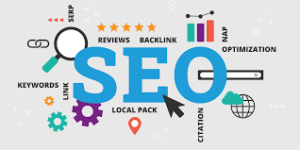“60 Essential SEO Terms Everyone Must Know for Website SEO”

1. SEO (Search Engine Optimization) : The process of optimizing a website to improve its visibility and rankings on search engine results pages (SERPs).
2. SERP (Search Engine Results Page) : The page displaying search results after a user queries a search engine.
3. Keywords : Words or phrases used by people to search for information on search engines.
4. Backlinks : Incoming links from other websites to your site, which help to improve your site’s authority and ranking.
5. Meta Tags : HTML elements providing information to search engines about a web page’s content.
6.Title Tag : HTML element defining the title of a web page displayed on SERPs.
7. Meta Description : HTML element providing a concise summary of a web page’s content in search results.
8.Alt Text : Descriptive text added to an image, helping search engines understand its content.
9. Sitemap : A file that lists all pages on a website, facilitating search engine indexing.
10. Crawling : The process where search engines scan and analyze web pages for indexing.
11.Indexing : The process of adding web pages to a search engine’s database.
12.Robots.txt : A file that instructs search engine crawlers which pages to crawl or avoid.
13.Canonical URL : A preferred URL that search engines should index to avoid duplicate content issues.
14. On-Page SEO : Optimizing content and HTML elements within a webpage for better rankings.
15. Off-Page SEO : Activities outside the website that influence its search engine rankings, like backlink building.
16. Domain Authority : A metric that predicts a website’s ranking potential based on several factors.
17. PageRank : A now-retired algorithm used by Google to rank web pages based on link popularity.
18. Keyword Density : The percentage of times a keyword appears in a webpage’s content.
18. Long-Tail Keywords : Specific niche keywords with lower search volume but higher intent.
19. Organic Traffic : Visitors who come to your website from search engine results, not through paid ads.
20. SEM (Search Engine Marketing) : Digital marketing strategies to increase website visibility on search engines, including SEO and PPC.
21. PPC (Pay-Per-Click) : An online advertising model where advertisers pay a fee each time their ad is clicked.
22. CTR (Click-Through Rate) : The percentage of people who clicked on a specific link out of the total number of impressions.
23. Bounce Rate : The percentage of visitors who leave a website after viewing only one page.
24. Conversion Rate : The percentage of website visitors who complete a desired action (e.g., purchase, sign-up).
25. Google Analytics : A web analytics service by Google to track and report website traffic.
26. Google Search Console : A tool that helps monitor and optimize a website’s performance in Google search results.
27. Keyword Research : The process of identifying relevant keywords for SEO strategies.
28.White Hat SEO : Ethical SEO techniques that comply with search engine guidelines.
29. Black Hat SEO : Unethical SEO techniques that violate search engine guidelines.
30. Anchor Text : The clickable text of a hyperlink.
31. 301 Redirect : A permanent redirect from one URL to another, preserving link juice.
32. 404 Error : A page not found error displayed when a page no longer exists or has been moved.
33. 302 Redirect : A temporary redirect from one URL to another.
34. Nofollow Link : A hyperlink with a “nofollow” attribute, indicating search engines should not follow the link.
35. Dofollow Link : A regular hyperlink that search engines can follow and pass link equity.
36. LSI Keywords : Latent Semantic Indexing keywords that are contextually related to a primary keyword.
37. Mobile-Friendly : Websites optimized for smooth navigation and usability on mobile devices.
38. Schema Markup : Structured data markup to provide context and additional information to search engines.
39. XML Sitemap : A sitemap format designed for search engines to crawl and index content.
40. Google My Business : A free tool to manage a business’s online presence on Google.
41. Local SEO : Optimizing a website to improve visibility in local search results.
42. Algorithm : A set of rules used by search engines to rank websites based on relevance and authority.
43. Above the Fold : Content visible on a webpage without scrolling.
44. Canonicalization : The process of choosing a preferred URL for a webpage to avoid duplicate content issues.
45. Rich Snippet : Enhanced search results with additional information displayed on SERPs.
46. Robots Meta Tag : A meta tag instructing search engines on crawling and indexing specific pages.
47. Dwell Time : The time a visitor spends on a webpage before returning to the search results.
48. User Experience (UX) : The overall experience a user has while interacting with a website.
49. Search Console : A tool used by webmasters to monitor website performance on search engines.
50. SEO (Search Engine Optimization) : The process of optimizing a website to improve its visibility and rankings on search engine results pages (SERPs).
.
51. Domain Rating (DR) : A metric used by SEO tools to measure the authority of a domain on a scale from 0 to 100. Higher DR indicates stronger backlink profiles and potential to rank well.
52. Domain Age : The length of time since a domain was first registered. Older domains are often considered more trustworthy by search engines.
53. Keyword Stuffing : An outdated and black hat SEO technique where keywords are excessively repeated in content, aiming to manipulate rankings.
54. Crawl Budget : The number of web pages a search engine bot crawls and indexes from a website during a given time period.
55. Canonical URL : The preferred URL chosen to represent duplicate or similar content, consolidating link equity for better SEO.
56. Page Speed : The time it takes for a webpage to load fully. Faster loading times positively impact user experience and SEO.
57. Link Building : The process of acquiring backlinks from other websites to improve a site’s authority and rankings.
58. Google PageRank : An older algorithm by Google used to measure the importance of web pages based on backlinks.
59. Niche : A specialized segment within an industry where businesses focus on specific target audiences and keywords.
60. SSL Certificate : A security protocol that encrypts data between a user’s browser and a website server, signaling a secure connection.
For more information visit site
